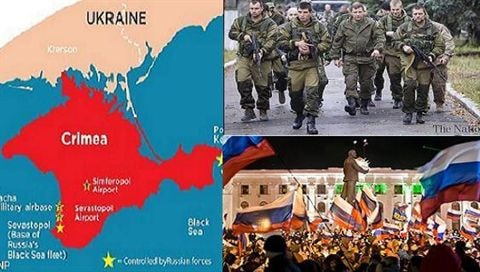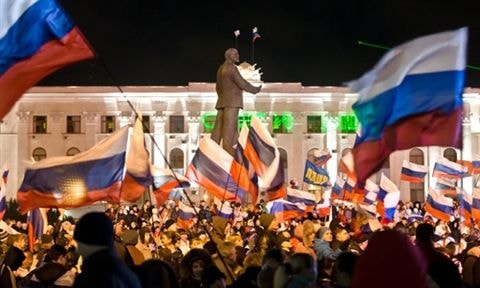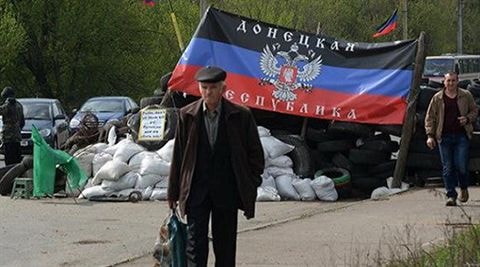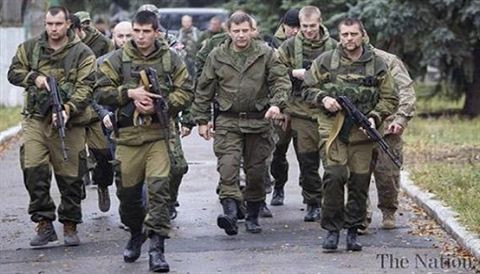"Crimean Spring": A bloody lesson on ethnic equality
The wars in Yugoslavia, Iraq... in the past up to Ukraine today all stem from the failure to properly resolve the issue of equality between nations.
Russia-Ukraine: Two extremes of the national question
While Moscow has done very well, Kiev has made serious mistakes in the issue of harmoniously resolving ethnic and religious issues. Discrimination against Russians and alienation of the Russian language have caused Kiev to lose the Crimean peninsula and possibly lose some other territories with strong Russian cultural imprints.
We can see this through President V. Putin's speech to the nation on the great historical significance of the "Unity Treaty" annexing Crimea to the Russian Federation on March 18, 2014. In it, he affirmed that it is correct for Crimea to have three official languages: Russian, Ukrainian and Crimean Tatar.
Of particular importance is Mr. Putin’s assertion that Russia must take all political and legal measures to complete the process of restoring the “national rights” of the Crimean Tatar people. This demonstrates the freedom and equality of each nation in the common home of Crimea, of each republic in the entire Russian Federation.
The presence of “national equality and freedom of language for the Tatar people” in Mr. Putin’s “State of the Nation Address” on March 18 once again demonstrated Russia’s correct policy in resolving international affairs and demonstrated its determination to build peace and stability on the Crimean peninsula.
Their consistent and deliberate policies and actions were directed towards a clear goal: to prevent the seeds of rebellion in Crimea. It would be wrong to assume that the Muscovites won the Crimea by sending troops into Symferopol or by promises of aid and economic development.
 |
| Ukraine has lost Crimea and may lose Lugansk and Donetsk as well due to mistakes in its ethnic policy. |
The Russian victory is also shown in the fact that, taking advantage of the anti-Russian and anti-Russian policies of the Kiev government, Moscow has influenced the pro-Russian and anti-Western mentality of the people of eastern Ukraine, causing the people of Donbass to stand up for independence, creating a buffer zone for Russia against NATO's eastward expansion.
Moscow has focused on the issue of "people's hearts and minds", creating social discontent about a government built by a coup, stirring up dissatisfaction with the central government in Kiev and paving the way for holding a referendum on "expanding autonomy within the federalized Ukraine or the possibility of joining the Russian Federation".
Russia focuses on the issue of “humanity” and considers it extremely important because the international community can hardly refute the so-called “genuine aspirations of the people”. This will be the legal basis for Russia to carry out annexation activities or support separatist regions in Ukraine.
Sure enough, in all regions there were “referendums” held, witnessed by Western observers and media so that no one could doubt the results. What is especially important is that they all took place in a state of peace, stability and were voluntary.
The Russians did not make the same mistake as the former Soviet Union and what helped them to win was to reconcile conflicts, resolve relations between ethnic groups within a single entity and know how to exploit ethnic issues to achieve their goals. This is a great lesson that other countries should learn.
 |
| Crimean people celebrate the day of annexation to the Russian Federation |
Mr. Putin once mocked the West about Russia's so-called "invasion" of Crimea and explained that it was due to "the people's desire", and challenged the US and Europe to find an invasion without bombs and bullets exploding like the events the US and NATO did in Yugoslavia, Iraq, Afghanistan, Libya...
Until now, Mr. Putin can still confidently declare that Moscow annexed Crimea into the territory of the Russian Federation because it "could not refuse the burning desire of the people on the peninsula", and that Donbass demanded independence because they did not accept the rule of a Kiev government that "usurped power by violence and built democracy at the tip of a gun".
A painful lesson for Ukraine on the issue of equality between peoples
On the Ukrainian side, the anti-Russian policy of the leadership not only caused them to lose Crimea but also the possibility of losing two eastern provinces. It seems that Kiev does not understand that for a multi-ethnic country, the issue of harmonizing interests between ethnic groups is of utmost importance, deciding the strength of the great national unity bloc.
Minorities in every country have the right to live, to be respected and to develop their own national values. However, the pro-Western Kiev government has deprived the Russians of their historical heritage and even their language, robbing them of their national roots. This is Kiev’s biggest mistake.
The pro-Western politicians who took power after the “Orange Revolution 1” failed to consolidate national unity, and at the same time “anti-Russian” actions became part of state policy, and the suppression of the Russian language and culture began to appear in all areas of Ukrainian social life.
 |
| Russia has taken advantage of pro-Russian, anti-Western sentiment to promote the independence movement in Donbass. |
War-mongering slogans such as: “Ukraine is not Russia”, “Ukrainians are not Russians”, “Russia is invading Ukraine” are pushing this country into the abyss of civil war, causing long-term instability on the border between the two countries and will spread throughout Europe.
The Kiev government has incited hatred and turned a blind eye as Ukrainian neo-fascists toppled Lenin's statue, shouted to hang and stab "Moskals" (Russians) to death, and reclaimed "the ancient Ukrainian land, which seemed to stretch all the way to the Ural Mountains."
Ukrainian Prime Minister Arseny Yatsenyuk also calmly distorts history, belittling the blood of soldiers from the republics of the Soviet Union - including Ukrainians - who sacrificed their lives to protect the Soviet Union, defeat the Germans, and protect the world from the fascist threat, with statements that are revisionist in nature.
If the Maidan participants saw the West as a model for the future, then Eastern Ukraine saw the West as a regime that imposes everything on its interests. Eastern Ukraine has always been in favor of establishing political, military, economic, diplomatic, cultural and linguistic ties with Russia.
For the East, the Customs Union is a symbol of their alignment with Russia. The Easterners are ready to accept Ukraine's entry into the Customs Union as a step forward on the path to stability and development of the country, while Kiev forces them to choose the Western path.
Therefore, when called upon, the people of the East and Crimea unanimously rose up against the new pro-Western government. The fratricidal war between Kiev and the two breakaway republics DPR and LPR would not have happened if Kiev considered all ethnic groups living in Ukraine as equal.
 |
| If Kiev had not implemented an anti-Russian policy, civil war would not have broken out in eastern Ukraine. |
Looking at the fratricidal war in Kosovo that led to the disintegration of the Yugoslav Federation or the current civil war in Iraq, we can see that they all stem from a common denominator: conflict between ethnic groups, even conflicts between lines within the same ethnic group.
This has shown that if the relationship between communities and ethnic groups in a country is not properly resolved, it will inevitably lead to ethnic conflicts, civil wars and create excuses for foreign intervention to destroy the country as in Yugoslavia and Iraq.
Ukraine has not learned this lesson and is now facing a state of division. Just one irresponsible decision with regard to the fate of the nation, showing “excessive enthusiasm” for the West by the Kiev government, has caused the country to fall apart.
If the previous and post-coup Kiev governments had not proposed the "foolish" policy of anti-Russian and anti-Russian language, Moscow would have had no reason to take Crimea back to its side, and at the same time could not have incited fear among the people of eastern Ukraine, causing them to rise up and demand independence.
Lessons from the "Crimean Spring" show that, for all multi-ethnic countries, the issue of harmoniously resolving relations between ethnic groups, achieving ethnic equality, caring for ethnic minorities and implementing a policy of ethnic harmony is an extremely important factor, decisive for the peaceful and stable development of the country.
If this issue is resolved well, it will build great national unity and promote the strength of the entire people in building and defending the Fatherland. Otherwise, it will easily create conflicts between ethnic groups, incite separatist sentiments, and create loopholes for the enemy to exploit to sabotage, cause political instability, and lead to riots and overthrow.
According to baodatviet.vn
| RELATED NEWS |
|---|






